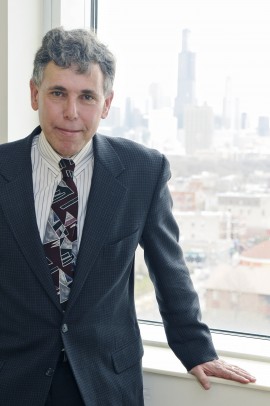Fight Ebola: get a flu shot, health experts say

Public health researcher Ronald Hershow encourages people to get their flu shot “so that you won’t be concerned that a garden variety of flu is Ebola,” he says.
Get your flu shot.
That’s the best response to the Ebola outbreak, said Ronald Hershow, epidemiology and biostatistics director of the School of Public Health, in a forum Nov. 12 at the School of Public Health.
“So that you won’t be concerned that a garden variety of flu is Ebola,” he said.
Hershow’s comments were part of a panel discussion with Kathy Ritger, medical director of the Chicago Department of Public Health, Mark Dworkin, UIC professor of epidemiology, and Allison Arwady, epidemic intelligence service officer for the Centers for Disease Control and Prevention.
Hershow noted that there is no evidence that Ebola is terrorism-related.
“Instead, this outbreak strongly reinforces the adage that ‘nature is the best terrorist,’” he said.
Fruit bats are apparently the primary animal reservoir of the Ebola virus. Humans can become infected by eating bats butchered for meat, he said.
Civil unrest left Guinea, Liberia and Sierra Leone, the West African countries hardest hit by the outbreak, vulnerable to destruction of forest by mining and timber companies. “As a result,” Hershow said, “fruit bats moved closer to human settlements.”
Humans aren’t the only animals threatened. In 2002 and 2003, an Ebola virus strain killed about 5,000 gorillas in a Congo sanctuary, he said.
The U.S. Public Health Service’s response to Ebola has come in for criticism. Hershow quoted Bill Foege, the epidemiologist who helped eradicate smallpox in West Africa, in rebuttal.
Foege has said, “I am concerned that the straightforward, science-based approach taken by public health officials to limit Ebola’s potential spread in this country has spawned such harsh criticism that the critics themselves may be a bigger risk to public safety than this virus.”
Hershow said politics entered the picture with the decision to impose quarantine on health care workers returning from Ebola-affected areas.
Foege was again quoted: “When the governor of New York says he is instituting quarantine out of an abundance of caution, most can read the real reason as an abundance of politics.”
Ritger, of the Chicago Department of Public Health, said four Chicago hospitals have been designated to handle Ebola cases: Northwestern Memorial, Rush, University of Chicago and Lurie Children’s.
Noting that the state’s health care system was “overwhelmed” by an anthrax scare after 9-11, Dworkin asked Arwady, who is assigned to the Illinois Public Health Department, if Ebola was having a similar impact.
Workers are under “a large strain” but managing to attend to non-Ebola matters, she replied.
“Last October was so different from this October,” Arwady said. A year ago there was a government furlough, with health care workers deemed “nonessential.”
“Today, no one is thinking public health is nonessential,” she said.
